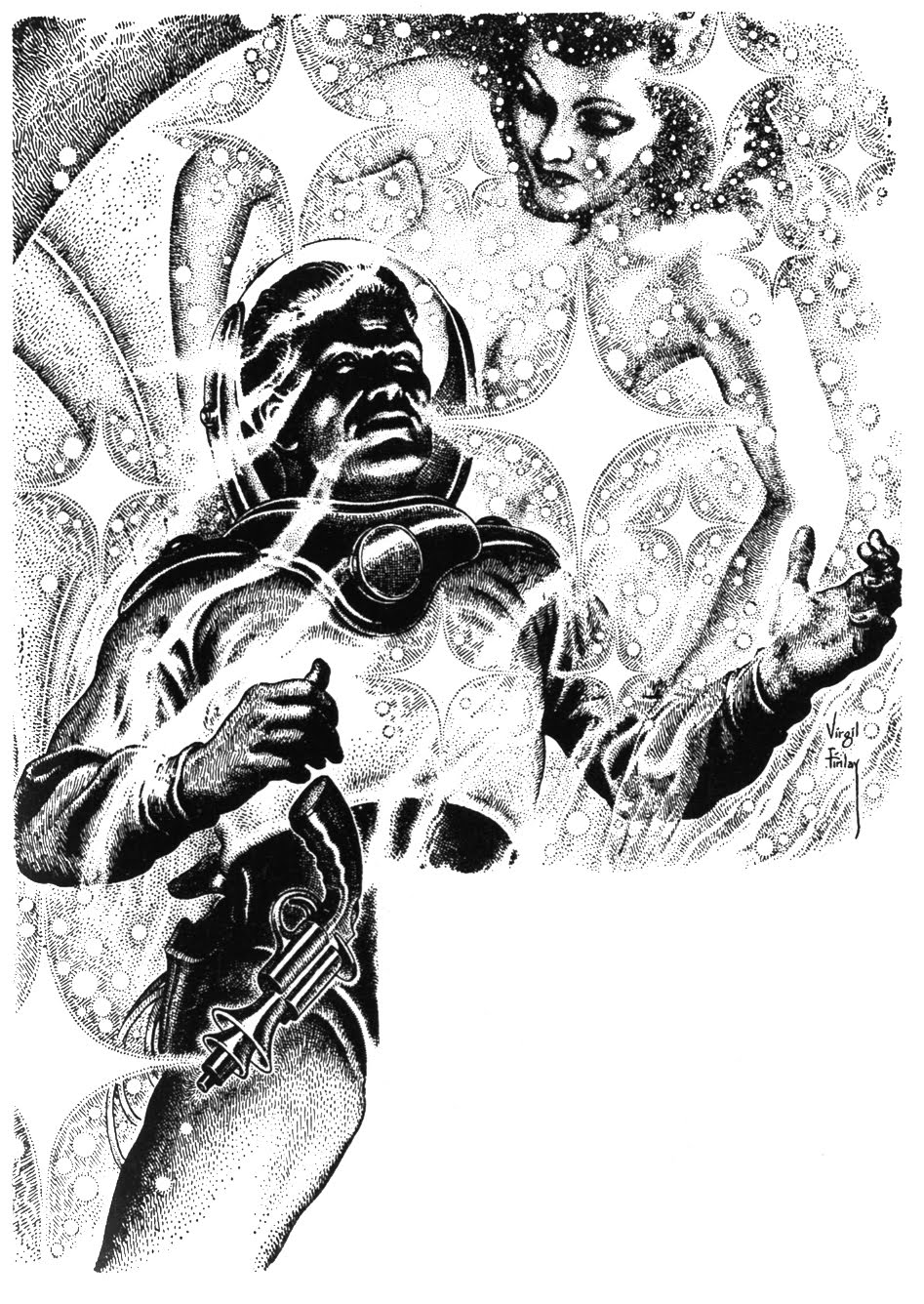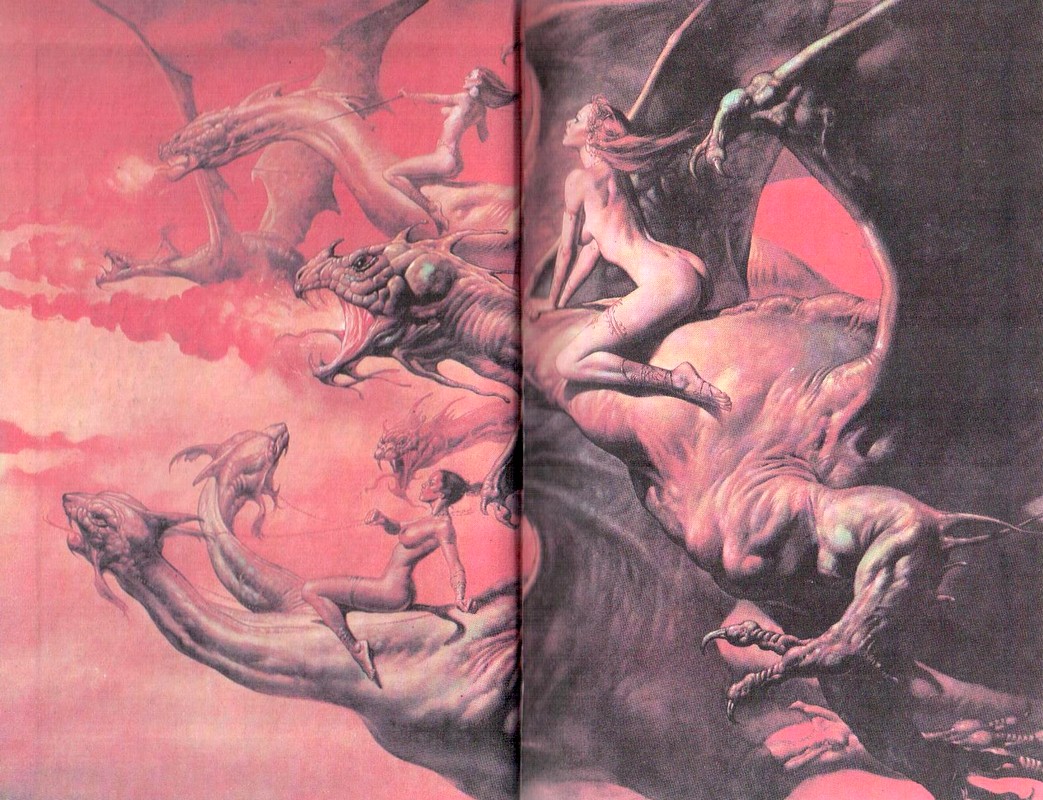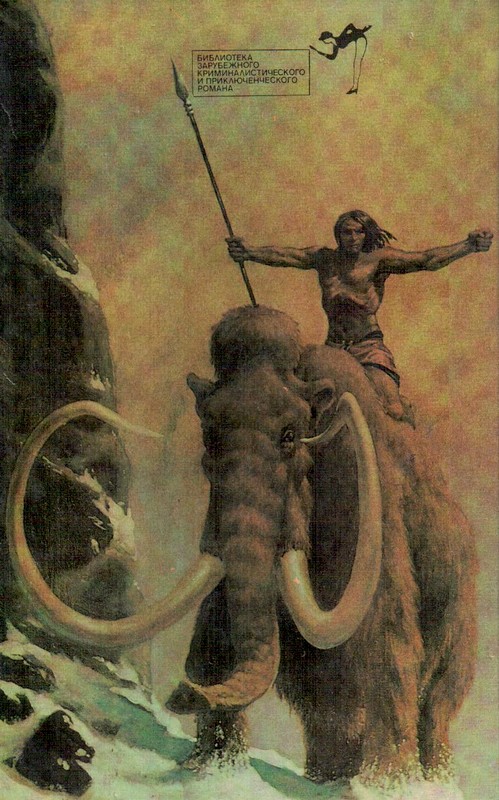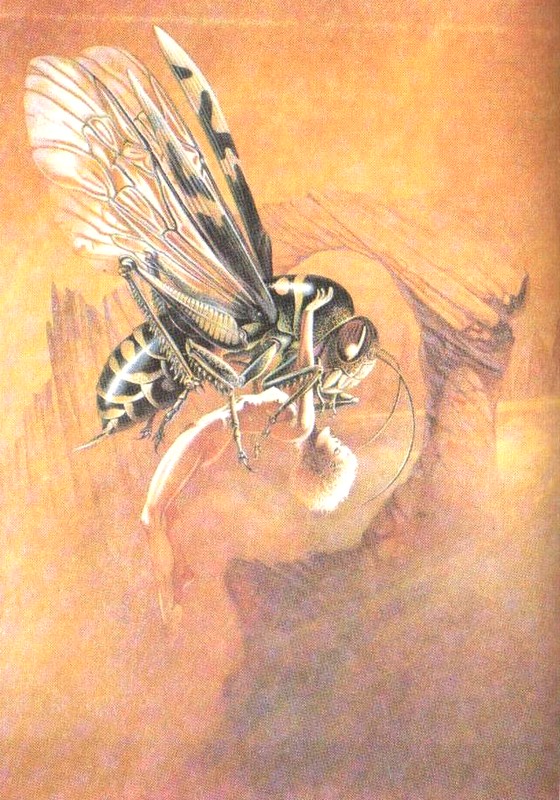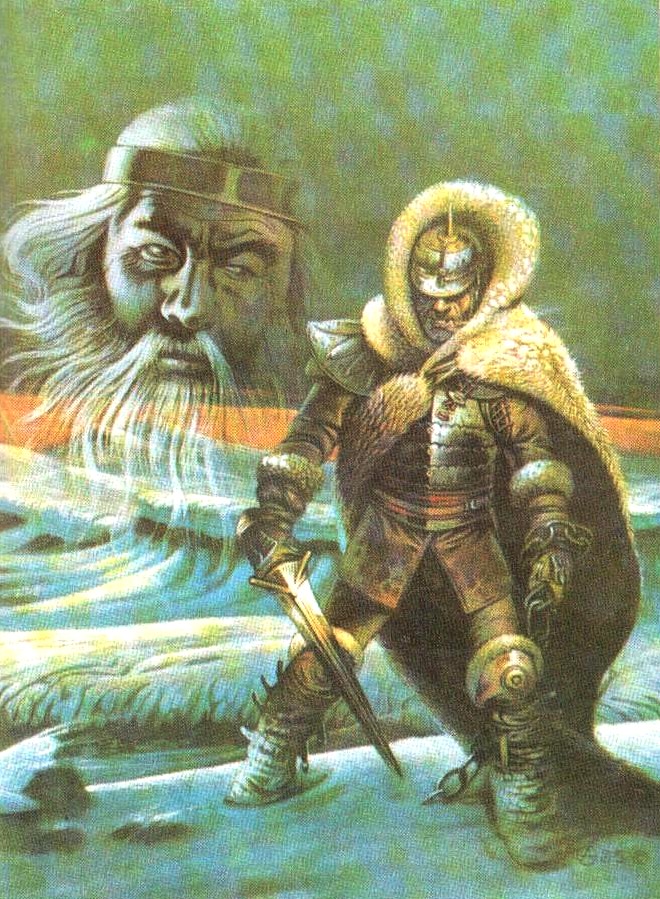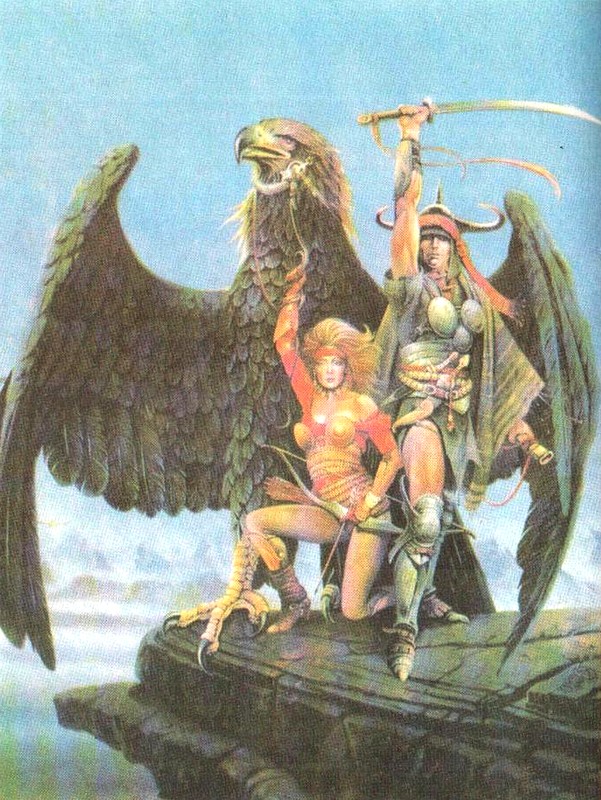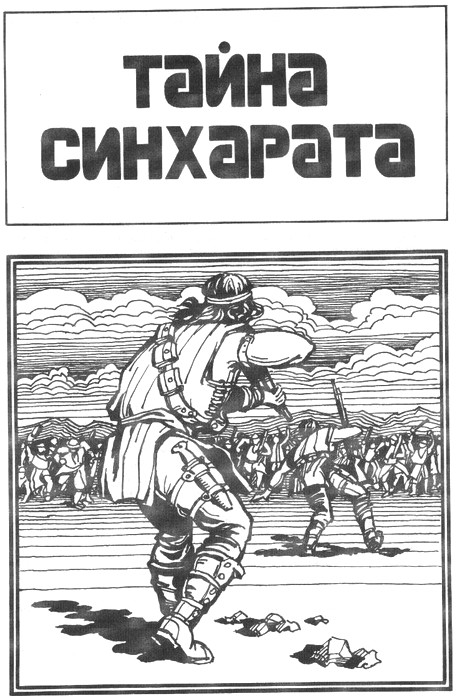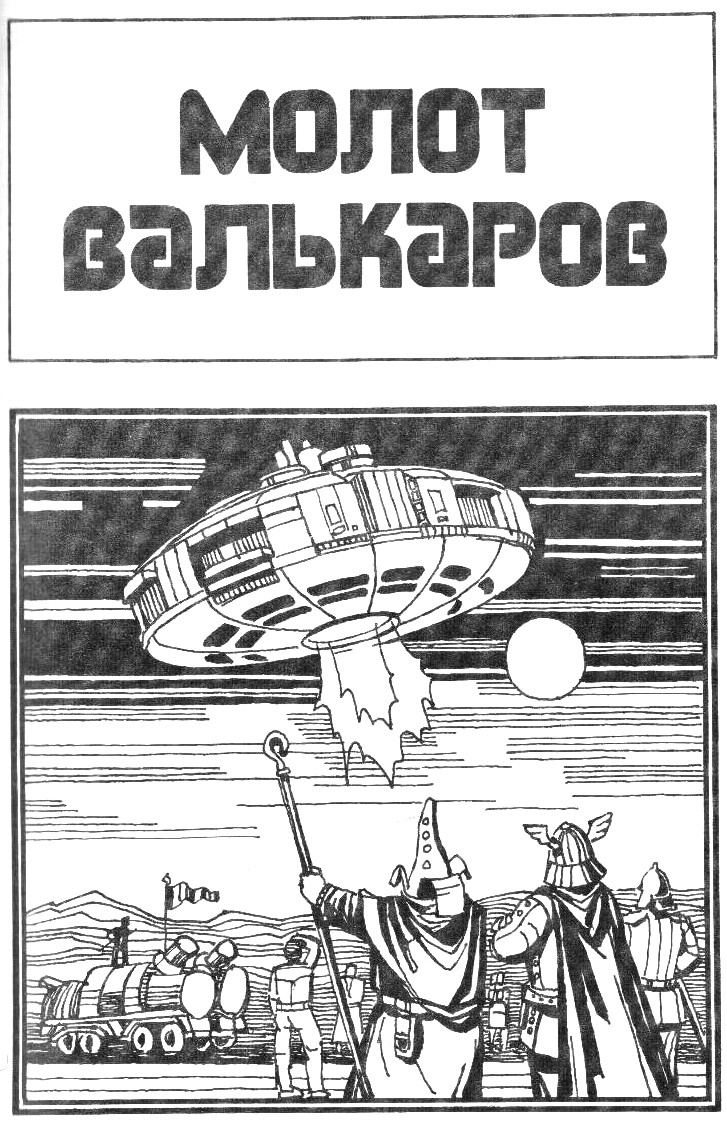Brackett, Leigh (1915-1978)
Leigh Brackett was a popular presence in mid-twentieth-century American science fiction. She is best known for her skill in writing space opera —she was labeled the "Queen of Space Opera"—as well as for her screenplay for the second Star Wars film, The Empire Strikes Back (1980). Brackett's writing is characterized by vivid imagery and realistic dialogue. She worked across a range of media and influenced numerous other writers.
Brackett's early works, short stories such as "Martian Quest" and "Enchantress of Venus," were published in the pulp science fiction magazines: her first stories appeared in Astounding Stories in 1940. Despite the reputation of the pulps as a male-dominated field of production, women writers such as Brackett did play a role in the shaping and development of the genre. In a period where space opera was popular, Brackett's work showed the influence of key writers in this field— particularly, Edgar Rice Burroughs—while still constructing an original voice. Her knowing, even playful, reworkings of common ideas in the subgenre led her to construct intricately imagined societies, rounded characters, and memorably vivid landscapes. Despite using male protagonists, she portrayed female characters as active, capable, and complex. Brackett's longer fiction, including The Sword of Rhiannon (1953), The Ginger Star (1974), and The Hounds of Skaith (1976), depicted worlds and societies undergoing social change, embedded within their environment and with their own histories. She also explored the consequences of a nuclear apocalypse and the construction of a rural religious community in The Long Tomorrow (1955).
Brackett's adaptability was shown in her ability to cross media, demonstrated by the plays and television and film screenplays she wrote. She also crossed genres, writing westerns (Rio Brauo, 1959) and film noir {The Big Sleep, 1946). She wrote the first draft of the screenplay for The Empire Strikes Back shortly before her death. Brackett was an active part of the science fiction writing community: she collaborated with Ray Bradbury and with her husband, Edmond Hamilton. Other science fiction writers, notably Marion Zimmer Bradley and Michael Moorcroft, have acknowledged Brackett's influence.
Brackett has occupied an uneasy place in the feminist science fiction canon, caught between the desire to reclaim a "herstory" of science fiction and a critical preference for explicitly feminist texts. Brackett is a key example of women that published science fiction before Second Wave feminism. However, a number of factors have resulted in the lack of critical attention to her work. She is cited as an exemplar in response to feminist critiques but worked mainly in the subgenre of space opera—not known as an especially fertile area for feminist writers. She was not engaged with feminism either in her life or in her texts. Nonetheless, Brackett's work exemplifies the negotiation of generic tropes undertaken by women writers of science fiction.
3.5 out of 5
Wednesday, December 21, 2011
Saturday, December 10, 2011
A Memory of Murder - Ray Bradbury
"This is a collection of Bradbury's very early crime stories, some of his first fiction sales. It comes complete with a short but revealing introduction that explains why the book is dedicated to Leigh Brackett."
Unseen.
http://billcrider.blogspot.com/2011/12/forgotten-books-memory-of-murder-ray.html
"Bradbury provides an interesting introduction, where he explains his debt to Leigh Brackett (friend and sometimes collaborator; herself a past master of the mystery genre). "
http://home.wlv.ac.uk/~in5379/books/memory_murder.htm
Unseen.
http://billcrider.blogspot.com/2011/12/forgotten-books-memory-of-murder-ray.html
"Bradbury provides an interesting introduction, where he explains his debt to Leigh Brackett (friend and sometimes collaborator; herself a past master of the mystery genre). "
http://home.wlv.ac.uk/~in5379/books/memory_murder.htm
Tuesday, October 18, 2011
The Demon Princes - Jack Vance

Stumbled across this - the same cover is used for The Halfing and Other Stories as this German edition of the Demon Princes.
4.5 out of 5
Friday, October 14, 2011
Wednesday, September 14, 2011
A Working Script from Rio Bravo - Leigh Brackett and Jules Furthman
An acution for :-
"A Working Script from "Rio Bravo." Warner Bros., 1959. Yellow covers, screen play by Jules Furthman and Leigh Brackett, dated "February 26, 1958," marked "Final," 122 pages, every single page folded in half by Wayne (except the last three) as was his habit with scripts he used on set, not annotated. (Please note all pages are frayed and wrinkled.)
With JW's Folding: 11" x 5"; Unfolded: 11" x 9"
Estimate: $5,000 - $7,000."
5 out of 5
http://entertainment.ha.com/c/item.zx?saleNo=7045&lotNo=44082
"A Working Script from "Rio Bravo." Warner Bros., 1959. Yellow covers, screen play by Jules Furthman and Leigh Brackett, dated "February 26, 1958," marked "Final," 122 pages, every single page folded in half by Wayne (except the last three) as was his habit with scripts he used on set, not annotated. (Please note all pages are frayed and wrinkled.)
With JW's Folding: 11" x 5"; Unfolded: 11" x 9"
Estimate: $5,000 - $7,000."
5 out of 5
http://entertainment.ha.com/c/item.zx?saleNo=7045&lotNo=44082
Tuesday, September 13, 2011
The Sword of Rhiannon Ace Doubles Instructions - Leigh Brackett

via Marooned - Science Fiction and Fantasy Books On Mars
3.5 out of 5
http://sffbooksonmars.blogspot.com/2011/09/read-first-few-pages-of-leigh-bracketts.html
The Sword of Rhiannon: Cast of Characters - Leigh Brackett
Excerpt from reproduction via Marooned - Science Fiction and Fantasy Books On Mars of the Ace Double version :-

3.5 out of 5
http://sffbooksonmars.blogspot.com/2011/09/read-first-few-pages-of-leigh-bracketts.html

3.5 out of 5
http://sffbooksonmars.blogspot.com/2011/09/read-first-few-pages-of-leigh-bracketts.html
Wednesday, July 27, 2011
Rio Bravo - Leigh Brackett
Author: Leigh Brackett; Mieczysław Dutkiewicz
Publisher: Szczecin : Wydawnictwo "Przygoda", 1990.
Series: '">Westerny z "Przygody".
Edition/Format: Book : Fiction : Polish
http://www.worldcat.org/title/rio-bravo/oclc/76311057&referer=brief_results
Publisher: Szczecin : Wydawnictwo "Przygoda", 1990.
Series: '">Westerny z "Przygody".
Edition/Format: Book : Fiction : Polish
http://www.worldcat.org/title/rio-bravo/oclc/76311057&referer=brief_results
Skytelystne cowboys - Leigh Brackett
Author: Leigh Brackett
Publisher: Oslo : Fredhøis Forlag, 1961.
Series: En norsk pocket bok
Edition/Format: Book : Fiction : Norwegian
http://www.worldcat.org/title/skytelystne-cowboys/oclc/4903553&referer=brief_results
Publisher: Oslo : Fredhøis Forlag, 1961.
Series: En norsk pocket bok
Edition/Format: Book : Fiction : Norwegian
http://www.worldcat.org/title/skytelystne-cowboys/oclc/4903553&referer=brief_results
Rio Bravo Western-Roman - Leigh Brackett
Author: Leigh Brackett
Publisher: München Heyne 1985
Series: Heyne-Bücher / 5 / Heyne-Western, 5, Heyne-Western, Nr. 2725
Edition/Format: Book : German : Neuaufl
http://www.worldcat.org/title/rio-bravo-western-roman/oclc/74734907&referer=brief_results
Publisher: München Heyne 1985
Series: Heyne-Bücher / 5 / Heyne-Western, 5, Heyne-Western, Nr. 2725
Edition/Format: Book : German : Neuaufl
http://www.worldcat.org/title/rio-bravo-western-roman/oclc/74734907&referer=brief_results
Rio Bravo - Leigh Brackett
Spanish edition
"Leigh Brackett; F Sesén
Publisher: Barcelona Toray 1961.
Series: Best Sellers del Oeste, vol. 13
Edition/Format: Book : Spanish"
http://www.worldcat.org/title/rio-bravo/oclc/431802188?referer=list_view
"Leigh Brackett; F Sesén
Publisher: Barcelona Toray 1961.
Series: Best Sellers del Oeste, vol. 13
Edition/Format: Book : Spanish"
http://www.worldcat.org/title/rio-bravo/oclc/431802188?referer=list_view
Rio Bravo - Leigh Brackett
I discovered the Corgi edition by winning an auction on ebay for a minimum bid - big surprise for it to show up as a UK book :-
"London, Corgi. 1959, First Edition. Mass Market Paperback, 16mo - over 5¾ - 6¾ tall. (200 gram rate) first UK issue in same year as US, paperback movie issue with cover art of John Wayne, Dean Martin and Ricky Nelson, rear cover has photos of the main roles as well,"
"London, Corgi. 1959, First Edition. Mass Market Paperback, 16mo - over 5¾ - 6¾ tall. (200 gram rate) first UK issue in same year as US, paperback movie issue with cover art of John Wayne, Dean Martin and Ricky Nelson, rear cover has photos of the main roles as well,"
Rio Bravo - Leigh Brackett

It seems there is a Polish edition of this book.
3.5 out of 5
http://www.abebooks.com/servlet/BookDetailsPL?bi=4616705117&searchurl=kn%3Drio%2Bbravo%2Bbrackett%26x%3D0%26y%3D0
Thursday, July 21, 2011
Sense of Wonder - Leigh Brackett
"Leigh Brackett – Born on December 7th, 1915 in Los Angeles, California, her birth name was Leigh Douglass Brackett and she was the daughter of William Franklin and Margaret Douglass Brackett. Her father was a certified public accountant who died in the influenza epidemic of 1918. Brackett was subsequently raised in Santa Monica by her mother and grandparents."
3.5 out of 5
http://wonder.swordsmith.com/guide/index.php/archives/417
3.5 out of 5
http://wonder.swordsmith.com/guide/index.php/archives/417
Thursday, June 9, 2011
Leigh Brackett: Heroic Fantasy at its Best - John M. Whalen
"Whenever there are discussions of heroic fantasy fiction, the usual names are trotted out: Howard, Leiber, Carter, Moorcock. But there is one name that is sometimes overlooked and really should be added to that list. Leigh Brackett (1915-1978) may best be known to some as a Hollywood screenwriter, but she also wrote some of the best heroic fantasy stories ever published."
3.5 out of 5
http://www.roguebladesentertainment.com/2011/06/leigh-brackett-heroic-fantasy-at-its-best/
3.5 out of 5
http://www.roguebladesentertainment.com/2011/06/leigh-brackett-heroic-fantasy-at-its-best/
Saturday, June 4, 2011
Leigh Brackett and Howard Hawks at work on Rio Bravo
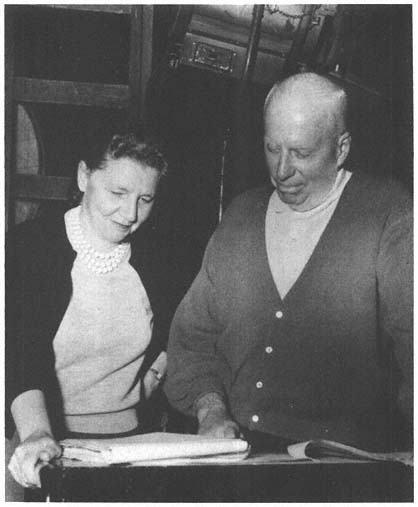
""Tuning in to the same channel": Leigh Brackett and director Howard Hawks at work on Rio Bravo(Photo: Museum of Modern Art)
I don't like to say this, because it sounds presumptuous, but Hawks and I kind of tuned in on the same channel with regard to the characters, and I think this is probably one reason that I worked with him so long. He was able to get out of me what he wanted because I had somewhat the same attitude towards the characters as he did."
5 out of 5
http://scribomatic.com/go-into-the-story-how-they-write-a-script-leigh-brackett-06-2011/
Wednesday, June 1, 2011
Wednesday, May 4, 2011
Overlooked Movie: Crime Doctor’s Manhunt - Randy Johnson
A blog post about this work :-
"An ex-soldier comes to Dr. Ordway for help, telling of experiencing temporary loss of memory, only to come out of it wandering the same strange part of the city. Ordway agrees to take him on as a patient and he leaves. Shortly a young woman stops him, his fiancee, wanting to know what he wanted with the Doctor. Ordway can’t even admit he’s a patient."
3.5 out of 5
http://randall120.wordpress.com/2011/05/02/overlooked-movie-crime-doctors-manhunt/
"An ex-soldier comes to Dr. Ordway for help, telling of experiencing temporary loss of memory, only to come out of it wandering the same strange part of the city. Ordway agrees to take him on as a patient and he leaves. Shortly a young woman stops him, his fiancee, wanting to know what he wanted with the Doctor. Ordway can’t even admit he’s a patient."
3.5 out of 5
http://randall120.wordpress.com/2011/05/02/overlooked-movie-crime-doctors-manhunt/
Tuesday, April 12, 2011
Tuesday, March 29, 2011
Friday, March 18, 2011
The First Star Wars - Leigh Brackett and Edmond Hamilton
Presumably The Secret of Sinharat and would be much rougher guesses at the Hamilton.
http://fantlab.ru/edition24131
Russian to English translation
Ed. Hamilton, Leigh Brackett
The first star wars
Tallinn: Melor, 1995
Series: Library of foreign forensic and adventure novel
Circulation: 15,000 copies.
ISBN: 5-7979-0412-8, 5-87005-020-0
Type of cover: hard
Pages: 288
Description:
Volume 7 *. Overseas action-fantasy.
Compiled by A. Sayapin.
The illustration on the front cover of George Bernard Shaw, on the flyleaf B. Vallejo
Between pages 224 and 225 are four inserts with illustrations by K. Ahilleosa.
Translators, and artists in the publication are not specified.
Contents:
# Edmond Hamilton. The War of the galaxy (the novel), page 3-144
# Edmond Hamilton. Hammer Valkar (novel), pages 145-218
# Lie bracket. Mystery Sinharata (novel), pages 219-286
Note:
The format of the publication is not specified.
Information about the publication available: vikc, darkseed
http://translate.google.com.au/translate_t?q=google%20translate&hl=en&client=opera&hs=mvt&rls=en&channel=suggest&prmd=ivns&um=1&ie=UTF-8&sa=N&tab=vT#ru|en|google%20translate
http://fantlab.ru/edition24131
Russian to English translation
Ed. Hamilton, Leigh Brackett
The first star wars
Tallinn: Melor, 1995
Series: Library of foreign forensic and adventure novel
Circulation: 15,000 copies.
ISBN: 5-7979-0412-8, 5-87005-020-0
Type of cover: hard
Pages: 288
Description:
Volume 7 *. Overseas action-fantasy.
Compiled by A. Sayapin.
The illustration on the front cover of George Bernard Shaw, on the flyleaf B. Vallejo
Between pages 224 and 225 are four inserts with illustrations by K. Ahilleosa.
Translators, and artists in the publication are not specified.
Contents:
# Edmond Hamilton. The War of the galaxy (the novel), page 3-144
# Edmond Hamilton. Hammer Valkar (novel), pages 145-218
# Lie bracket. Mystery Sinharata (novel), pages 219-286
Note:
The format of the publication is not specified.
Information about the publication available: vikc, darkseed
http://translate.google.com.au/translate_t?q=google%20translate&hl=en&client=opera&hs=mvt&rls=en&channel=suggest&prmd=ivns&um=1&ie=UTF-8&sa=N&tab=vT#ru|en|google%20translate
Monday, February 21, 2011
Sunday, February 13, 2011
Wednesday, February 2, 2011
Earth's Renaissance - Leigh Brackett
"Earth's Renaissance" an essay by Leigh Brackett (Stfette, #2, July '41)
Unseen.
Unseen.
For Leigh Brackett - Ray Bradbury
"For Leigh Brackett" a poem by Ray Bradbury in an even more limited edition of Haffner's Lorelei of the Red Mist.
Unseen.
Unseen.
Shadows in the Woods - Leigh Brackett
"Shadows in the Woods" by Leigh Brackett (Venus, Volume One, Number 1, Jun '44)
Unseen and length unknown.
Unseen and length unknown.
Brackett Tales - Leigh Brackett
Unfortunately only available as part of a 100 book extremely limited and extremely edition
Table of Contents - BRACKETT TALES
"Lorelei of the Red Mist" facsimile of first appearance by Leigh Brackett and Ray Bradbury from Planet Stories, Summer '46
"Shadows in the Woods" by Leigh Brackett (Venus, Volume One, Number 1, Jun '44)
"For Leigh Brackett" a poem by Ray Bradbury (original to this book)
"Earth's Renaissance" an essay by Leigh Brackett (Stfette, #2, July '41)
Gallery of postcards, letters, and book inscriptions from Ray Bradbury to Leigh Brackett & Edmond Hamilton
"B.T.’s Feature Flash" autobiographical article by Leigh Brackett (Planet Stories, Win '42)
"The Vizigraph" Letter to Planet Stories by Leigh Brackett (Planet Stories, Sum '43)
Unseen (barring the last two part's of course)
http://www.haffnerpress.com/1893887251.html
Table of Contents - BRACKETT TALES
"Lorelei of the Red Mist" facsimile of first appearance by Leigh Brackett and Ray Bradbury from Planet Stories, Summer '46
"Shadows in the Woods" by Leigh Brackett (Venus, Volume One, Number 1, Jun '44)
"For Leigh Brackett" a poem by Ray Bradbury (original to this book)
"Earth's Renaissance" an essay by Leigh Brackett (Stfette, #2, July '41)
Gallery of postcards, letters, and book inscriptions from Ray Bradbury to Leigh Brackett & Edmond Hamilton
"B.T.’s Feature Flash" autobiographical article by Leigh Brackett (Planet Stories, Win '42)
"The Vizigraph" Letter to Planet Stories by Leigh Brackett (Planet Stories, Sum '43)
Unseen (barring the last two part's of course)
http://www.haffnerpress.com/1893887251.html
The Long Tomorrow - Leigh Brackett
From publisher Phoenix Pick :-
The Long Tomorrow (available 2/10/2010)
ISBN 978-1-61242-013-4, 202 Pages, Trade Paperback 6”x9”
One of the original novels of post-nuclear holocaust America, The Long Tomorrow is considered by many to be one of the finest science fiction novels ever written on the subject. The story has inspired generations of new writers and is still as mesmerizing today as when it was originally written.
Len and Esau are young cousins living decades after a nuclear war has destroyed civilization as we know. The rulers of the post-war community have forbidden the existence of large towns and consider technology evil.
However Len and Esau long for more than their simple agrarian existence. Rumors of mythical Bartorstown, perhaps the last city in existence, encourage the boys to embark on a journey of discovery and adventure that will call into question not only firmly held beliefs, but the boys' own personal convictions.
http://www.phoenixpick.com/catalogue/PPickings.htm
The Long Tomorrow (available 2/10/2010)
ISBN 978-1-61242-013-4, 202 Pages, Trade Paperback 6”x9”
One of the original novels of post-nuclear holocaust America, The Long Tomorrow is considered by many to be one of the finest science fiction novels ever written on the subject. The story has inspired generations of new writers and is still as mesmerizing today as when it was originally written.
Len and Esau are young cousins living decades after a nuclear war has destroyed civilization as we know. The rulers of the post-war community have forbidden the existence of large towns and consider technology evil.
However Len and Esau long for more than their simple agrarian existence. Rumors of mythical Bartorstown, perhaps the last city in existence, encourage the boys to embark on a journey of discovery and adventure that will call into question not only firmly held beliefs, but the boys' own personal convictions.
http://www.phoenixpick.com/catalogue/PPickings.htm
The Best of Edmond Hamilton - Leigh Brackett
Phoenix Pick has a new edition, both paper and ebook :-
"The Best of Edmond Hamilton (Edited by Leigh Brackett)
ISBN 978-1-60450-489-7, 348 Pages, Trade Paperback 6”x9”
Here is a collection of some of the finest short fiction penned by one of "fathers" of modern science fiction.
These stories were selected (and edited) by his wife Leigh Brackett, an author and a screenwriter. Her screen-writing credits include works on such films as The Big Sleep, Rio Bravo, The Long Goodbye and Star Wars: The Empire Strikes Back.
This collection spans nearly half a century of Edmond Hamilton's work and was selected from a repository of hundreds of stories that he had written over that period.."
4 out of 5
"The Best of Edmond Hamilton (Edited by Leigh Brackett)
ISBN 978-1-60450-489-7, 348 Pages, Trade Paperback 6”x9”
Here is a collection of some of the finest short fiction penned by one of "fathers" of modern science fiction.
These stories were selected (and edited) by his wife Leigh Brackett, an author and a screenwriter. Her screen-writing credits include works on such films as The Big Sleep, Rio Bravo, The Long Goodbye and Star Wars: The Empire Strikes Back.
This collection spans nearly half a century of Edmond Hamilton's work and was selected from a repository of hundreds of stories that he had written over that period.."
4 out of 5
Tuesday, February 1, 2011
On Robert E. Howard - Leigh Brackett
"Howard had a great love for all that was lost and strange and faraway. One thinks of him sitting at his typewriter in Cross Plains, Texas, a young man dreaming great dreams of gods and heroes far beyond the narrow boundaries of his own space and time, roaming free across the wonderful landscapes he saw in his mind."
4 out of 5
http://theblogthattimeforgot.blogspot.com/2011/02/in-praise-of-robert-e-howard.html
4 out of 5
http://theblogthattimeforgot.blogspot.com/2011/02/in-praise-of-robert-e-howard.html
The Jungle Book - Rudyard Kipling
A particular book that influenced Brackett in her youth.
4 out of 5
http://www.gutenberg.org/ebooks/236
4 out of 5
http://www.gutenberg.org/ebooks/236
Monday, January 31, 2011
Edgar Rice Burroughs - Leigh Brackett
Clearly a big influence in her youth, as she said multiple times.
5 out of 5
5 out of 5
Survey of the Ancient World - James Henry Breasted
Brackett came across this in the 'seventh or eighth grade' and became an Ancient History buff.
The book appears to be a general survey from early man to the rise of christianity.
Note that it is public domain.
Unread.
http://www.archive.org/details/surveyofancientw00breauoft
The book appears to be a general survey from early man to the rise of christianity.
Note that it is public domain.
Unread.
http://www.archive.org/details/surveyofancientw00breauoft
Memberships - Leigh Brackett
According to John L. Carr, she held these :-
Writers Guild of America
Television Academy of Arts and Sciences
International Platform Association
Western Writers of America
Science Fiction Writers of America
Mystery Writers of America
Writers Guild of America
Television Academy of Arts and Sciences
International Platform Association
Western Writers of America
Science Fiction Writers of America
Mystery Writers of America
Monday, January 24, 2011
ASTRO ADVENTURES #5 Dragon Queen of Jupiter - Leigh Brackett
According to this ebay listing :-
"ASTRO ADVENTURES #5 (1988) 5 1/2 x 8 1/2, 50 pages. Very Fine condition. Edited and published by Robert M. Price. A Star Pirate story by Lin Carter. "The Gentle Anger" by Raymond Z. Gallun. A reprint "Dragon Queen of Jupiter" by Leigh Brackett from PLANET STORIES, and more. Art by Robert Knox, Allen Koszowski and others."
 http://i.ebayimg.com/09/!CDhDsowBmk~$(KGrHqQOKm8Ez39zRQDRBNO2q(Rf,w~~0_3.JPG
http://i.ebayimg.com/09/!CDhDsowBmk~$(KGrHqQOKm8Ez39zRQDRBNO2q(Rf,w~~0_3.JPG
http://cgi.ebay.com/1988-Sci-Fi-fanzine-ASTRO-ADVENTURES-5-Leigh-Brackett-/230577037743
"ASTRO ADVENTURES #5 (1988) 5 1/2 x 8 1/2, 50 pages. Very Fine condition. Edited and published by Robert M. Price. A Star Pirate story by Lin Carter. "The Gentle Anger" by Raymond Z. Gallun. A reprint "Dragon Queen of Jupiter" by Leigh Brackett from PLANET STORIES, and more. Art by Robert Knox, Allen Koszowski and others."
http://cgi.ebay.com/1988-Sci-Fi-fanzine-ASTRO-ADVENTURES-5-Leigh-Brackett-/230577037743
Monday, January 17, 2011
Beudag - Origins and Definition
Beudag - Origins and Definition
This is not a common name by any stretch, and if you check a search engine or two, not a name at all, anywhere else.
In the story, the meaning of the character's name is given: "his sister Beudag, which means Dagger-in-the-Sheath".
Thanks to Google books and some old dictionaries we find
In Irish :-
From A dictionary of the Gaelic language in two parts : -
Beudag means 'A trifling, idle, tattling, little woman'.
http://www.archive.org/stream/dictionaryofgae00macl/dictionaryofgae00macl_djvu.txt
Clearly this is not what Brackett meant if she knew the meaning of the word, unless she meant it ironically. A war leader is hardly a trifling woman. Neither is a woman that doesn't break under torture a tattler.
In Welsh :
Beudag means 'the head or top of the windpipe, the throat'
From the Antiquæ linguæ Britannicæ thesaurus
http://books.google.com.au/books?id=7XlbAAAAQAAJ&pg=PT57&dq=beudag&hl=en&ei=yOMzTZSGHIqIuAOhq5zvCw&sa=X&oi=book_result&ct=result&resnum=5&ved=0CDcQ6AEwBA#v=onepage&q=beudag&f=false
Or larynx, as in :- An English-Welsh pronoucing Dictionary By William Spurrell
http://www.archive.org/stream/geiriadurcymraeg00spur
The only time Beudag is mentioned in a throat sense is when Starke is fighting for control of his mind and is used against her : 'Starke put his arms around her. He found her mouth, almost cruelly. Her arms were tight about him, her eyes half closed and dreaming. Starke's hands slipped upward, toward her throat, and locked on it.'
and the result, later, when he is himself :-
"Beudag crouched in the bow, facing Starke. She was bound securely with strips of the white cloth she had worn. Bruises showed dark on her throat."
or in vision :- "and suddenly he saw Beudag clearly—half-veiled and mystic in the candlelight at Faolan's dun; smooth curving bronze, her hair loose fire about her throat."
Brackett may have used this for the double use - Starke is used to attack Beudag by the throat, and that is how he kills their enemy Rann, too.
What references Brackett and Bradbury may have had about this we can't know, or if she made up the name at it just happened to be a word. Beudag's brother Faolan's name has actually been in use. And Faolan and Conan are Irish, so if it was the Irish meaning she knew - Dagger-In-the-Sheath and 'trifling or gossipy woman'?
To broaden the Celtic approach, we find :-
A treatise on the language, poetry and music of the Highland clans By Donald Campbell in 1862.
"a dirk, literally, the little deadly one.""
And this is basically the meaning of her name Brackett gives in the story.
http://www.archive.org/details/atreatiseonlang00campgoog
http://books.google.com.au/books?pg=PA40&dq=beudag&ei=Tt4zTZ_zHIXsvQPZmLmzCw&ct=result&id=e3kCAAAAQAAJ&output=text
This meaning is of course Scots, not Irish.
So Brackett it appears was taking her names from any Celtic source she fancied. Presumably it is feasible that a later 19th century reference was still kicking around in a library or bookshop or university or someone's house she knew in California somewhere in the mid twentieth.
5 out of 5
This is not a common name by any stretch, and if you check a search engine or two, not a name at all, anywhere else.
In the story, the meaning of the character's name is given: "his sister Beudag, which means Dagger-in-the-Sheath".
Thanks to Google books and some old dictionaries we find
In Irish :-
From A dictionary of the Gaelic language in two parts : -
Beudag means 'A trifling, idle, tattling, little woman'.
http://www.archive.org/stream/dictionaryofgae00macl/dictionaryofgae00macl_djvu.txt
Clearly this is not what Brackett meant if she knew the meaning of the word, unless she meant it ironically. A war leader is hardly a trifling woman. Neither is a woman that doesn't break under torture a tattler.
In Welsh :
Beudag means 'the head or top of the windpipe, the throat'
From the Antiquæ linguæ Britannicæ thesaurus
http://books.google.com.au/books?id=7XlbAAAAQAAJ&pg=PT57&dq=beudag&hl=en&ei=yOMzTZSGHIqIuAOhq5zvCw&sa=X&oi=book_result&ct=result&resnum=5&ved=0CDcQ6AEwBA#v=onepage&q=beudag&f=false
Or larynx, as in :- An English-Welsh pronoucing Dictionary By William Spurrell
http://www.archive.org/stream/geiriadurcymraeg00spur
The only time Beudag is mentioned in a throat sense is when Starke is fighting for control of his mind and is used against her : 'Starke put his arms around her. He found her mouth, almost cruelly. Her arms were tight about him, her eyes half closed and dreaming. Starke's hands slipped upward, toward her throat, and locked on it.'
and the result, later, when he is himself :-
"Beudag crouched in the bow, facing Starke. She was bound securely with strips of the white cloth she had worn. Bruises showed dark on her throat."
or in vision :- "and suddenly he saw Beudag clearly—half-veiled and mystic in the candlelight at Faolan's dun; smooth curving bronze, her hair loose fire about her throat."
Brackett may have used this for the double use - Starke is used to attack Beudag by the throat, and that is how he kills their enemy Rann, too.
What references Brackett and Bradbury may have had about this we can't know, or if she made up the name at it just happened to be a word. Beudag's brother Faolan's name has actually been in use. And Faolan and Conan are Irish, so if it was the Irish meaning she knew - Dagger-In-the-Sheath and 'trifling or gossipy woman'?
To broaden the Celtic approach, we find :-
A treatise on the language, poetry and music of the Highland clans By Donald Campbell in 1862.
"a dirk, literally, the little deadly one.""
And this is basically the meaning of her name Brackett gives in the story.
http://www.archive.org/details/atreatiseonlang00campgoog
http://books.google.com.au/books?pg=PA40&dq=beudag&ei=Tt4zTZ_zHIXsvQPZmLmzCw&ct=result&id=e3kCAAAAQAAJ&output=text
This meaning is of course Scots, not Irish.
So Brackett it appears was taking her names from any Celtic source she fancied. Presumably it is feasible that a later 19th century reference was still kicking around in a library or bookshop or university or someone's house she knew in California somewhere in the mid twentieth.
5 out of 5
Friday, January 14, 2011
Leigh Brackettt - Dianne Newell and Victoria Lamont
"Dianne Newell and Victoria Lamont, “Leigh Brackett (1915-1978),” Fifty Key Figures in Science Fiction, Mark Bould et al., eds. (Routledge: 2009), 37-41."
"Leigh Brackett was one of a handful of women associated with early American sf. She is one of the only ones remembered for writing space opera, which she began doing for the pulp magazines in the early 1940s, when it was popular but looked down upon by many writers and editors. The tenacity and volume of her writing in this subgenre led to her being given the title the "Queen" of space opera. A consummate science-fantasist, she is remembered for her very visual picture of Mars and Venus and for Eric John Stark, the maverick, part-native hero she created to wander the solar system. Through the repackaging of her classic science fantasy, especially her Stark stories of the 1950s, Brackett contributed to the new traditions in, and revival of, space opera in the 1970s, though she was at odds with emerging feminist approaches to sf.
Brackett grew up in California. Her diverse and prolific career spanned from the 1940s, her period of greatest activity in the sf magazines, until her death. Her first story, the realistic "Martian Quest" (1940), was written for Astounding Science-Fiction, but she moved on to writing space opera for the pulp magazines Planet Stories, Startling Stories, and limiting Wonder Stories, scripts for Hollywood thrillers and westerns (notably for Howard Hawks), hard-boiled detective stories and novels, television scripts, and updating her Stark stories for 1970s audiences. At the time of her death, she had drafted the screenplay for Star Wars: Episode V - The Empire Strikes Back (Kershner 1980), for which she posthumously received a Hugo in 1981. She is often (perhaps overly) discussed in the context of her marriage to Edmond Hamilton, a popular author of classic space opera.
Brackett's rendering of Mars was inspired by Edgar Rice Burroughs's Mars stories, of which she was a voracious reader, and to a lesser
extent by Rudyard Kipling, H. Rider Haggard, and A. Merritt. Like Burroughs, Brackett drew from American frontier mythology to represent Mars as a far more ancient planet than Earth, a planet whose "civilized" period had long since passed. First appearing in Planet Stories in 1949, Brackett's Stark is a forerunner to the morally ambivalent frontier heroes of westerns in the 1960s. Whereas Burroughs's John Carter embodies unambiguously American cultural superiority over the declining civilization of Barsoom (Mars), Stark is introduced as a mercenary with ambiguous allegiances. A human raised by the indigenes of Mercury in a semi-savage state, Stark is captured while still a child by human colonists who display him in a cage like a zoo animal, before he is rescued and civilized by Simon Ashton, who works for an agency implicated in the administration of Earth's interplanetary empire. With his allegiances thus divided between his savage adopted tribe and his civilizing foster-father, Stark is as likely to take the side of the indigenous inhabitants of Mars and Venus as that of the colonizers. For example, in "Queen of the Martian Catacombs" (1949), Stark exposes the plot of a Martian chieftain to install himself in a puppet government propped up by colonial "outlanders." In "The Enchantress of Venus" (1949), Stark searches for a friend who has disappeared and finds himself entangled in the attempts of the declining ruling class to maintain their tyrannical hold over the people of Shuruun. In both cases, Stark is offered the opportunity to rule at the side of a conniving princess if he will only prop up her rule, and he refuses.
Stark is a complex character, haunted by his primitive upbringing and suffering from frequent flashbacks to his childhood, when, as N'Chaka, he lived in a state of constant vigilance. Civilization has not completely supplanted the primitive part of his character, which surfaces during moments of threat. Stark frequently feels fear, a sensation linked to his primitivity - but one which gives him an advantage by enabling him to respond to threats with the instinctive speed of an agile, wild animal. Brackett further figures Stark as racially mixed, his skin burnt "dark" by the hot sun of his home planet Mercury.
Martian romantic exotica also flourished in Brackett's "Black Amazon of Mars" (1951), "The Last Days of Shandakor" (1952), and "The Arc of Mars" (1953), at a time when most sf visions of Mars moved away from romance to take on new, realistic overtones as a result of scientific investigations. Brackett's sf and her hero Stark had already expanded into other worlds - mainly Venus, notably in "Lorelei of the Red Mist" (1946, with Ray Bradbury), "The Moon that Vanished" (1948), and "Enchantress of Venus."
Contrary to the common view that she moved away from the genre after the 1950s, Brackett continued to publish and reprint sf and science fantasy for the rest of her life. She always claimed that she wrote what she loved to read. Sf alone, she said, allowed a "soaring freedom of the imagination," but for money, she added, she wrote in other fields (Mallardi and Bowers 1969: 19-20).
In the 1940s and 1950s the reception of Brackett's space opera was mixed; it was praised for its rich settings and imaginative fantasy, but also found derivative and simplistic. Anxious to legitimize a disreputable pulp genre, sf critics have long deployed space opera and science fantasy as the "other" of sf, constructing a canon purportedly based on scientific accuracy. By these standards, the big winner for Brackett was her postapocalyptic, non-space-opera "legitimate" sf epic The Long Tomorrow (1955), which received rave reviews - for its realism, serious subject matter, and literary quality - from major critics such as Damon Knight and Anthony Boucher, and more recently John Clute and Brian Stableford. It also garnered Brackett a Hugo nomination. Set a couple of generations after a nuclear apocalypse, it depicts a future America under the sway of Mennonite principles. The Mennonites, a Christian sect that eschews technological development, find themselves in a position of power when technological civilization has been all but destroyed. Blamed for the nuclear apocalypse, advanced technology of all kinds is forbidden. A complex and subtle exploration of the relationship between the technological and the social, The Long Tomorrow enabled Brackett to explore issues that the short, sensational pulp format could not comfortably accommodate. It would be a mistake, however, to characterize Brackett as a "serious" writer trapped in the pulps, for she was a lifelong avid fan and defender of the popular.
Brackett revived her Stark series in the 1970s — this time in interstellar space, with The Ginger Star (1974), Vie Hounds of Skaith (1974), and The Reavers of Skaith (1976) — to good reviews. Paul A. Carter described Skaith as a prime example of the dying planet archetype, and Frederick Patten compared Skaith to J.R.R. Tolkien's Middle- earth. Whereas the earliest Stark tales depicted the Earth-led galactic empire as exploitative of the worlds in its path, the Skaith trilogy shifted away from the critique of empire, casting the Galactic Union as liberators. This mirrors the cultural climate in which Brackett was writing, which was in transition from the counterculturalism of the 1960s and polarized by US involvement in Vietnam.
The praise of male editors and critics of the 1970s notwithstanding, Brackett's sf understandably came under the scrutiny of feminist sf critics and anthologists of that decade. In interviews, Brackett spokewarmly about the sf community and denied that gender was an obstacle for her. Tellingly, she once remarked that if she was going to include a woman in one of her stories, she has to be doing something,
suggesting that Brackett was critical of conventions of female passivity in space opera. If so, she did not convert these conventions, but chose to focus on male-centered adventure stories and maverick heroes such as Stark, in which the most prominent female characters tend to be exotic alien queens or princesses. Not easily fitting the mold of the emerging feminist sf of the 1970s, Brackett (and space opera) were criticized by the likes of Joanna Russ and excluded from Pamela
Sargent’s groundbreaking Women ry Wonder (1975) anthology.
Although Brackett’s work made it into Sargent’s More Women of Wonder (1976), her masculine style and aggressive heroes were emphasized as characteristic of her style and the fact that it did not seem to matter to readers that she was a woman was noted (Sargent 1976: xix). In later decades, however, Brackett was reconsidered by feminist critics such as Sargent, who praised her strong female characters.
Despite Brackett’s intentionally hard-boiled approach in her sf writing, she capitalizes upon the classic identification between the categories of the alien, the primitive, and the land, which in Western culture have along tradition of identification with the feminine, to create alien beings and landscapes that function as less obvious, yet potent, sites of identity subversion. For example, “The Woman from Altair" (1951) is told by a man but centered around an alien woman who appears, but turns out to be far from, frail. Similarly, feminine psychic
power - the ability to empathize with and assimilate foreign subjects, whether human or alien - is a futuristic manifestation of traditional feminine influence. Psychic or empathetic female characters appear in Brackett's “Mars Minus Bisha” (1954) and Alpha Centauri - or Die! (1963). In Alpha Centauri, Brackett also describes the chaotic atmosphere aboard a ship, focusing in particular on domesticity in outer
space and depicting a woman-led mutiny against the ship’s captain.
Yet, despite her impressive accomplishments, Brackett’s long, media-spanning career garnered her no sf awards in her lifetime (though she did win the 1957 jules Verne Fantasy Award and the 1963 Western Writers of America Golden Spur Award). Perhaps she
was not in the end appreciated in sf circles; no critical studies of her work exist and only one anthology of her sf stories not edited by herself was published during her lifetime: Edmond Hamilton’s The Best of Leigh Brackett (1977). There are, however, signs that Brackett's reputation is undergoing a revival. Michael Moorcock in an anthology of her early stories listed a “who’s who” of male sf authors who would count her as an important influence, including himself (Moorcock 2002: xi-xvi). ln 2005 she was awarded the Cordwainer Smith Foundation Rediscovery Award. In their 2006 examination of the space opera “renaissance,” David Hartwell and Kathryn Cramer remind us that Brackett’s contribution to the Star Wars franchise
established a link between space opera and commercial success.
Brackett is also beginning to receive attention as a pioneer of women's sf it is clear that Leigh Brackett was a prolific, versatile, and thoughtful writer whose space opera and science fantasy stories and books continue to lend themselves to reinterpretation."
"Leigh Brackett was one of a handful of women associated with early American sf. She is one of the only ones remembered for writing space opera, which she began doing for the pulp magazines in the early 1940s, when it was popular but looked down upon by many writers and editors. The tenacity and volume of her writing in this subgenre led to her being given the title the "Queen" of space opera. A consummate science-fantasist, she is remembered for her very visual picture of Mars and Venus and for Eric John Stark, the maverick, part-native hero she created to wander the solar system. Through the repackaging of her classic science fantasy, especially her Stark stories of the 1950s, Brackett contributed to the new traditions in, and revival of, space opera in the 1970s, though she was at odds with emerging feminist approaches to sf.
Brackett grew up in California. Her diverse and prolific career spanned from the 1940s, her period of greatest activity in the sf magazines, until her death. Her first story, the realistic "Martian Quest" (1940), was written for Astounding Science-Fiction, but she moved on to writing space opera for the pulp magazines Planet Stories, Startling Stories, and limiting Wonder Stories, scripts for Hollywood thrillers and westerns (notably for Howard Hawks), hard-boiled detective stories and novels, television scripts, and updating her Stark stories for 1970s audiences. At the time of her death, she had drafted the screenplay for Star Wars: Episode V - The Empire Strikes Back (Kershner 1980), for which she posthumously received a Hugo in 1981. She is often (perhaps overly) discussed in the context of her marriage to Edmond Hamilton, a popular author of classic space opera.
Brackett's rendering of Mars was inspired by Edgar Rice Burroughs's Mars stories, of which she was a voracious reader, and to a lesser
extent by Rudyard Kipling, H. Rider Haggard, and A. Merritt. Like Burroughs, Brackett drew from American frontier mythology to represent Mars as a far more ancient planet than Earth, a planet whose "civilized" period had long since passed. First appearing in Planet Stories in 1949, Brackett's Stark is a forerunner to the morally ambivalent frontier heroes of westerns in the 1960s. Whereas Burroughs's John Carter embodies unambiguously American cultural superiority over the declining civilization of Barsoom (Mars), Stark is introduced as a mercenary with ambiguous allegiances. A human raised by the indigenes of Mercury in a semi-savage state, Stark is captured while still a child by human colonists who display him in a cage like a zoo animal, before he is rescued and civilized by Simon Ashton, who works for an agency implicated in the administration of Earth's interplanetary empire. With his allegiances thus divided between his savage adopted tribe and his civilizing foster-father, Stark is as likely to take the side of the indigenous inhabitants of Mars and Venus as that of the colonizers. For example, in "Queen of the Martian Catacombs" (1949), Stark exposes the plot of a Martian chieftain to install himself in a puppet government propped up by colonial "outlanders." In "The Enchantress of Venus" (1949), Stark searches for a friend who has disappeared and finds himself entangled in the attempts of the declining ruling class to maintain their tyrannical hold over the people of Shuruun. In both cases, Stark is offered the opportunity to rule at the side of a conniving princess if he will only prop up her rule, and he refuses.
Stark is a complex character, haunted by his primitive upbringing and suffering from frequent flashbacks to his childhood, when, as N'Chaka, he lived in a state of constant vigilance. Civilization has not completely supplanted the primitive part of his character, which surfaces during moments of threat. Stark frequently feels fear, a sensation linked to his primitivity - but one which gives him an advantage by enabling him to respond to threats with the instinctive speed of an agile, wild animal. Brackett further figures Stark as racially mixed, his skin burnt "dark" by the hot sun of his home planet Mercury.
Martian romantic exotica also flourished in Brackett's "Black Amazon of Mars" (1951), "The Last Days of Shandakor" (1952), and "The Arc of Mars" (1953), at a time when most sf visions of Mars moved away from romance to take on new, realistic overtones as a result of scientific investigations. Brackett's sf and her hero Stark had already expanded into other worlds - mainly Venus, notably in "Lorelei of the Red Mist" (1946, with Ray Bradbury), "The Moon that Vanished" (1948), and "Enchantress of Venus."
Contrary to the common view that she moved away from the genre after the 1950s, Brackett continued to publish and reprint sf and science fantasy for the rest of her life. She always claimed that she wrote what she loved to read. Sf alone, she said, allowed a "soaring freedom of the imagination," but for money, she added, she wrote in other fields (Mallardi and Bowers 1969: 19-20).
In the 1940s and 1950s the reception of Brackett's space opera was mixed; it was praised for its rich settings and imaginative fantasy, but also found derivative and simplistic. Anxious to legitimize a disreputable pulp genre, sf critics have long deployed space opera and science fantasy as the "other" of sf, constructing a canon purportedly based on scientific accuracy. By these standards, the big winner for Brackett was her postapocalyptic, non-space-opera "legitimate" sf epic The Long Tomorrow (1955), which received rave reviews - for its realism, serious subject matter, and literary quality - from major critics such as Damon Knight and Anthony Boucher, and more recently John Clute and Brian Stableford. It also garnered Brackett a Hugo nomination. Set a couple of generations after a nuclear apocalypse, it depicts a future America under the sway of Mennonite principles. The Mennonites, a Christian sect that eschews technological development, find themselves in a position of power when technological civilization has been all but destroyed. Blamed for the nuclear apocalypse, advanced technology of all kinds is forbidden. A complex and subtle exploration of the relationship between the technological and the social, The Long Tomorrow enabled Brackett to explore issues that the short, sensational pulp format could not comfortably accommodate. It would be a mistake, however, to characterize Brackett as a "serious" writer trapped in the pulps, for she was a lifelong avid fan and defender of the popular.
Brackett revived her Stark series in the 1970s — this time in interstellar space, with The Ginger Star (1974), Vie Hounds of Skaith (1974), and The Reavers of Skaith (1976) — to good reviews. Paul A. Carter described Skaith as a prime example of the dying planet archetype, and Frederick Patten compared Skaith to J.R.R. Tolkien's Middle- earth. Whereas the earliest Stark tales depicted the Earth-led galactic empire as exploitative of the worlds in its path, the Skaith trilogy shifted away from the critique of empire, casting the Galactic Union as liberators. This mirrors the cultural climate in which Brackett was writing, which was in transition from the counterculturalism of the 1960s and polarized by US involvement in Vietnam.
The praise of male editors and critics of the 1970s notwithstanding, Brackett's sf understandably came under the scrutiny of feminist sf critics and anthologists of that decade. In interviews, Brackett spokewarmly about the sf community and denied that gender was an obstacle for her. Tellingly, she once remarked that if she was going to include a woman in one of her stories, she has to be doing something,
suggesting that Brackett was critical of conventions of female passivity in space opera. If so, she did not convert these conventions, but chose to focus on male-centered adventure stories and maverick heroes such as Stark, in which the most prominent female characters tend to be exotic alien queens or princesses. Not easily fitting the mold of the emerging feminist sf of the 1970s, Brackett (and space opera) were criticized by the likes of Joanna Russ and excluded from Pamela
Sargent’s groundbreaking Women ry Wonder (1975) anthology.
Although Brackett’s work made it into Sargent’s More Women of Wonder (1976), her masculine style and aggressive heroes were emphasized as characteristic of her style and the fact that it did not seem to matter to readers that she was a woman was noted (Sargent 1976: xix). In later decades, however, Brackett was reconsidered by feminist critics such as Sargent, who praised her strong female characters.
Despite Brackett’s intentionally hard-boiled approach in her sf writing, she capitalizes upon the classic identification between the categories of the alien, the primitive, and the land, which in Western culture have along tradition of identification with the feminine, to create alien beings and landscapes that function as less obvious, yet potent, sites of identity subversion. For example, “The Woman from Altair" (1951) is told by a man but centered around an alien woman who appears, but turns out to be far from, frail. Similarly, feminine psychic
power - the ability to empathize with and assimilate foreign subjects, whether human or alien - is a futuristic manifestation of traditional feminine influence. Psychic or empathetic female characters appear in Brackett's “Mars Minus Bisha” (1954) and Alpha Centauri - or Die! (1963). In Alpha Centauri, Brackett also describes the chaotic atmosphere aboard a ship, focusing in particular on domesticity in outer
space and depicting a woman-led mutiny against the ship’s captain.
Yet, despite her impressive accomplishments, Brackett’s long, media-spanning career garnered her no sf awards in her lifetime (though she did win the 1957 jules Verne Fantasy Award and the 1963 Western Writers of America Golden Spur Award). Perhaps she
was not in the end appreciated in sf circles; no critical studies of her work exist and only one anthology of her sf stories not edited by herself was published during her lifetime: Edmond Hamilton’s The Best of Leigh Brackett (1977). There are, however, signs that Brackett's reputation is undergoing a revival. Michael Moorcock in an anthology of her early stories listed a “who’s who” of male sf authors who would count her as an important influence, including himself (Moorcock 2002: xi-xvi). ln 2005 she was awarded the Cordwainer Smith Foundation Rediscovery Award. In their 2006 examination of the space opera “renaissance,” David Hartwell and Kathryn Cramer remind us that Brackett’s contribution to the Star Wars franchise
established a link between space opera and commercial success.
Brackett is also beginning to receive attention as a pioneer of women's sf it is clear that Leigh Brackett was a prolific, versatile, and thoughtful writer whose space opera and science fantasy stories and books continue to lend themselves to reinterpretation."
Thursday, January 13, 2011
Beudag: Lorelei of the Red Mist - Leigh Brackett

"She was tall. She was built and muscled like a lioness, and she walked with a flat-hipped arrogance, and her hair was like coiled flame. Her eyes were blue, hot and bright, as Faolan's might have been once. She looked like Faolan. She was dressed like him, in a leather kilt and sandals, her magnificent body bare above the waist. She carried a longsword slung across her back, the hilt standing above the left shoulder."
3 out of 5
Subscribe to:
Posts (Atom)


